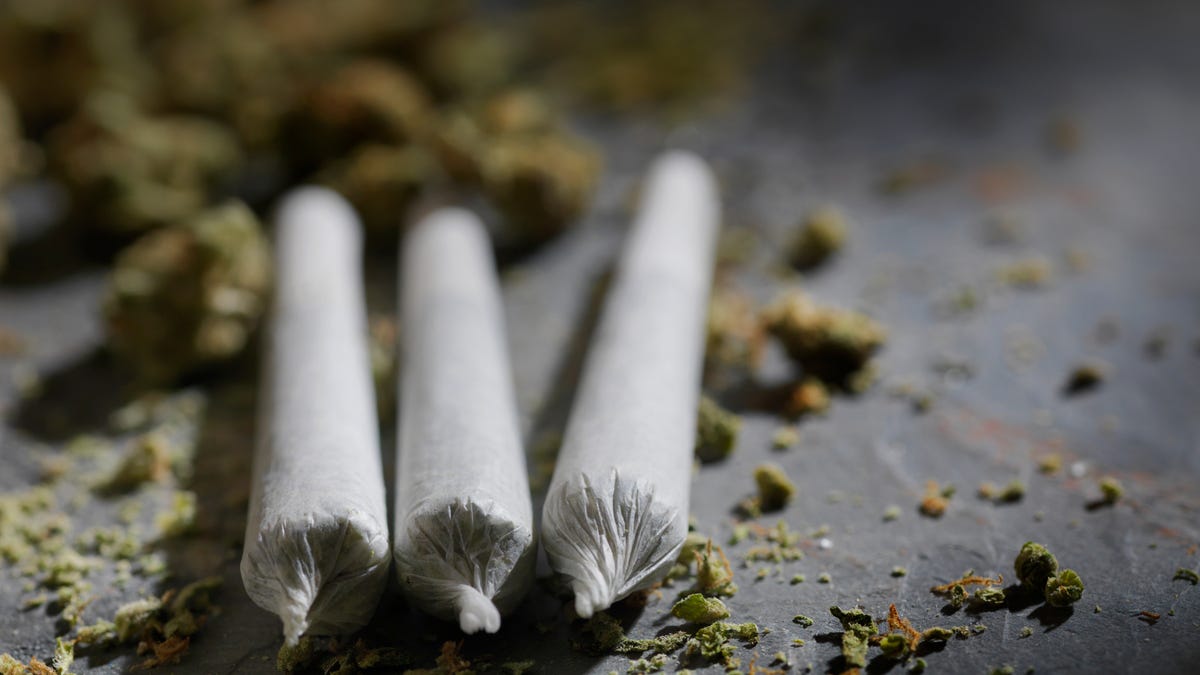Tennessee
Cannabis in Tennessee: What push to reclassify marijuana to Schedule III may mean

Medical marijuana found to treat depression, anxiety and improve sleep
A new study has found medical marijuana can help treat those diagnosed with depression, anxiety and improve sleep.
The Drug Enforcement Agency could move to reclassify marijuana to a lesser severity in what’s being reported as the “biggest change in marijuana policy” since the drug was first outlawed.
The proposal, first reported by The Associated Press, would follow a Department of Justice recommendation and lead the DEA to take public comments on a plan to recategorize marijuana, USA TODAY reports.
In this reclassification, marijuana would move from a Schedule I drug which is believed to be highly dangerous, addictive and not for medical use to a Schedule III drug that can be lawfully prescribed as medication. Marijuana has been a Schedule I drug since the Controlled Substances Act was signed in 1970 by President Richard Nixon.
Here is what we know about the reclassification.
What does rescheduling cannabis mean for Tennessee?
While this would be a landmark change, it would not change the state’s current cannabis regulations. It would still be a controlled substance even with the new classification. That said, 24 states have legalized marijuana for recreational use and 14 have legalized it for medical use.
In 2022, President Joe Biden directed the Department of Health and Human Services, or the HHS, to conduct a review of how marijuana is scheduled. In the review, the HHS recommended that the drug be rescheduled to a Schedule III.
Marijuana being classified as a Schedule III drug means it would be classified alongside drugs including ketamine, testosterone, anabolic steroids and Tylenol with codeine, USA TODAY reports. These drugs have “moderate to low potential for physical and psychological dependence,” according to the DEA.
The laws regarding Schedule III drugs in Tennessee vary as some drugs are legal with limitations and others are not. Therefore, it is hard to tell if the reclassification of marijuana to a lower schedule would sway Tennessee lawmakers to legalize the drug in any way.
Is marijuana legal in Tennessee?
There is no short answer to the question of whether marijuana is legal in Tennessee for a couple of reasons. Part of the confusion can stem from the various terms − cannabis, marijuana and weed − that might seem interchangeable but are not, at least not as Tennessee defines them. Hemp just adds to the confusion.
The defining difference between hemp and marijuana is their psychoactive component: tetrahydrocannabinol, or THC. Hemp has 0.3% or less THC, meaning hemp-derived products don’t contain enough THC to create the “high” traditionally associated with marijuana.
Tennessee has legalized the cultivation of hemp and defined hemp as cannabis sativa containing less than 0.3% THC. Cannabis sativa containing greater than 0.3% THC, which is defined by Tennessee as marijuana, is still illegal.
While marijuana is not legal, in Tennessee you can buy products containing CBD, or cannabidiol, an active ingredient in cannabis that is derived from the hemp plant but does not cause a high and is not addictive.
Is marijuana a dangerous drug?
Marijuana has been hard to study because of its classification. However, the move to reschedule the drug is largely due to the lower public health risks, federal scientists have said. The rescheduling of marijuana to a Schedule III drug would allow for further studies to be done.
In a leaked HHS document, officials wrote to the DEA in support of rescheduling the drug. Marijuana’s risk for addiction is similar to that of tobacco and has relatively mild withdrawal symptoms compared to alcohol. According to the National Institute on Drug Abuse, or NIDA, there are no known deaths from a marijuana overdose.
Despite the less intense symptoms, the drug does affect physical and mental health. According to NIDA, it can cause permanent IQ loss for people who begin using it at a young age. Long-term use has been associated with temporary paranoia and hallucinations. Marijuana can exacerbate symptoms with disorders like schizophrenia.
NIDA found that marijuana smoke has a similar health impacts to tobacco smoke. People who smoke marijuana frequently develop issues with breathing similar to those of tobacco smokers.
Respiratory issues include daily cough, phlegm and a higher risk of lung infections, however, the American Heart Association said it’s unclear if marijuana causes a greater risk of lung cancer.
Health benefits of marijuana
The cannabis plant has been used for medicinal purposes for centuries, if not millennia. It appears to help with treating pain, insomnia, anxiety, and glaucoma, among other health conditions. Still, evidence is mixed and more research into its health benefits is needed, researchers at Johns Hopkins Bloomberg School of Public Health said in August.
While cannabis is not approved for any medical use by the FDA, several drugs containing cannabinoids, or substances such as THC or CBD, have been approved according to the National Institutes of Health.
USA TODAY and Tennessee Connect reporter Liz Kellar contributed to this report

Tennessee
Tennessee ‘tough on crime’ bill will not make us safer and take away from rehabilitation
Public safety should be a top priority for Tennessee, along with proper treatment of law enforcement and of taxpayers. We must incentivize rehabilitation.
Nashville program brings live music — and hope — to prisons
Former musician Nathan Lee started a non-profit called Send Musicians to Prison that has been bringing live music to incarcerated people for 15 years.
When our state lawmakers propose laws that aim to be tough on crime, everyone deserves to know the facts about those laws – and what is and isn’t actually tough on crime. While it may seem that longer sentences behind Senate Bill 2044 contribute to public safety, the facts show a different story: This bill disincentivizes rehabilitation, making Tennessee prisons and our communities less safe.
The unfortunate truth about SB 2044 is that it will spur the consequences that excessive sentencing laws are known to create: bloated public spending, wasted law enforcement resources, and higher recidivism rates.
Legislation like SB 2044 do not make Tennessee safer. Rather than addressing the causes of crime or improving the ability to close cases, this bill simply disincentivizes rehabilitation in Tennessee prisons. Tennessee’s earned time credits – and their opportunity to shorten a sentence for eligible people – serve as a vital incentive for incarcerated people to improve their behavior and learn from educational, vocational, and rehabilitative programs, which help the Department of Corrections and improve public safety by encouraging incarcerated people to change their lives.
Public safety is at risk when incentives are weakened
Earned time credits are redirected away from the expiration of a person’s sentence, and instead apply to the person’s parole eligibility date. This amounts to an empty incentive as Tennessee’s parole board denies nearly three-fourths of all applicants, and SB 2044 has given no guarantee for parole grants and no mechanisms for early termination of parole supervision.
Simply put, weakening incentives is bad for public safety. When Arizona eliminated parole and earned time credits in 1993, prison rule violations increased by 50%, enrollment in educational programs dropped by 20%, and the reoffending rate jumped 4.8 percentage points. Tennessee’s prisons are currently severely understaffed. The last thing we should do make Tennessee prisons less safe and make life harder for those who live and work in them.
For the roughly 25% of people who do get an earlier parole, they will still need to spend the remainder of their sentence under parole supervision. That means expending additional resources from Tennessee’s parole officers and numerous pitfalls for returning citizens to manage as they try to successfully reintegrate to their communities and the workforce.
Research shows that most reoffending occurs within the first two years of parole supervision — leaving periods of supervision beyond that more an hindrance than a meaningful public safety policy. Requiring someone who has shown a commitment to reentry and successful adherence to the rules should be able to earn their way off of supervision. SB 2044 prevents that.
More: Incarcerated men find ‘new beginning’ at Tennessee prison’s first addiction program
Tennessee lawmakers knew this bill would cost a lot in the future
SB 2044 is especially tough on taxpayers. Outside of Medicaid, incarceration costs have been the second-fastest growing budget item for most states in recent years, and this bill adds to those costs.
The fiscal note for this bill indicates “significant increases in state expenditures to accommodate longer incarceration times and parolees being supervised for longer periods of time.” The Fiscal Review Committee reiterated the substantial cost at the Senate Finance, Ways, and Means Committee Hearing last month.
While the exact future cost from this bill is unknown, it amounts to a signed invoice to taxpayers to fund something that will have enormous cost and will negatively impact Tennessee prisons with no proven benefit to public safety.
Public safety should be a top priority for Tennessee, along with proper treatment of law enforcement and of taxpayers. We must incentivize rehabilitation. While SB 2044 aims to provide public benefit, it fails to meet the mark.
Matthew Charles, of Nashville, is a criminal justice expert and Senior Policy Advisor of FAMM.
Tennessee
Alligator caught on Norris Lake in Union County has a new home

KNOXVILLE, Tenn. (WVLT) – Back in March, a young angler caught an alligator on Norris Lake.
Previous Coverage: Alligator caught on Norris Lake in Union County
In the days that followed, Tennessee Wildlife Resources Agency’s Matt Cameron said it was likely brought into the state illegally.
“Someone brought it from another state and turned it loose in Norris Lake,” Cameron said.
Previous Coverage: An alligator was caught on Norris Lake— what do Tennessee wildlife officers have to say?
Cameron also said it’s illegal to own or bring an alligator into Tennessee, calling it an invasive species. He said Tennessee isn’t a good place for alligators to be.
“East Tennessee is not a good alligator habitat,” Cameron said. “They like swampy areas, warmer climates. Here in Tennessee, the winters get extremely cold and they don’t prefer deep-water lakes.”
After the alligator was caught, it was taken to Little Ponderosa Zoo and Rescue in Anderson County.
Little Ponderosa said on social media that after hundreds of calls, the zoo’s assistant manager, Abby, spoke to Jungle Adventures in Christmas, Florida.
Despite being nearly 700 miles away, Abby drove the alligator, now known as “Tennessee,” all the way to Florida to give him a new home.
“He will now spend his days lounging in the sun, with lots of other alligators his same size/age,” the zoo said.
Copyright 2024 WVLT. All rights reserved.
Tennessee
Tennessee professor swept away by wave during Brazil study-abroad trip has died

COLUMBIA, Tenn. — A Tennessee community college professor who was swept away by an ocean wave during a study-abroad trip in Brazil has died, his school said Monday.
Clifford Gordon, associate professor of art, was walking with three students along an oceanside road in Paraty, Brazil, when they stopped to take pictures and a wave struck them, according to Columbia State Community College. The three students were not seriously injured, but Gordon was swept away and Brazilian authorities searched for him, the school said.
Columbia State received confirmation on Monday morning that Gordon’s body was found and positively identified.
“We were heartbroken to hear of this tragic accident,” Janet F. Smith, Columbia State’s president, said in a statement on the school’s website. “We are thankful that no students were seriously injured. Our college family mourns the loss of Clifford, who was a talented artist and greatly loved by his students.”
The school said the study abroad program in Brazil included 12 students from four community colleges across Tennessee.
The students were scheduled to board flights Monday and arrive back in Tennessee on Tuesday, Rick Locker, a spokesperson for the College System of Tennessee, said. They will be offered counseling.
Two of the students who were with Gordon when he was swept away are from Pellissippi State Community College in Knoxville, while the other attends Walters State Community College in Morristown.
Gordon started working for Columbia State in 2008 as an adjunct professor and then moved to a full-time position in 2013. He also was known for works of collage and painting, which were on display at various exhibitions in the state.
Gordon had traveled to Brazil during many summers, even teaching himself to speak Portuguese, the school said. He had a Bachelor of Science degree in art from Tennessee State University and a Master of Fine Arts degree in studio art from the Memphis College of Art.
Paraty is located about 150 miles (241 kilometers) west of the city of Rio de Janeiro.
-

 News1 week ago
News1 week agoSkeletal remains found almost 40 years ago identified as woman who disappeared in 1968
-

 Movie Reviews1 week ago
Movie Reviews1 week ago“Kingdom of the Planet of the Apes”: Disney's New Kingdom is Far From Magical (Movie Review)
-

 World1 week ago
World1 week agoIndia Lok Sabha election 2024 Phase 4: Who votes and what’s at stake?
-

 World1 week ago
World1 week agoUkraine’s military chief admits ‘difficult situation’ in Kharkiv region
-

 World1 week ago
World1 week agoCatalans vote in crucial regional election for the separatist movement
-

 Movie Reviews1 week ago
Movie Reviews1 week agoAavesham Movie Review
-

 Politics1 week ago
Politics1 week agoNorth Dakota gov, former presidential candidate Doug Burgum front and center at Trump New Jersey rally
-

 News1 week ago
News1 week agoTrump, Reciting Songs And Praising Cannibals, Draws Yawns And Raises Eyebrows




















